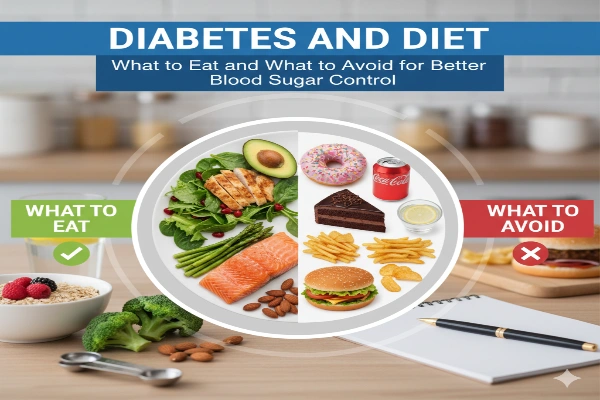Diabetes and Diet: What to Eat and What to Avoid for Better Blood Sugar Control
Worried why your blood sugar spikes? Tired of feeling overwhelmed about what you can and can't eat with diabetes? Managing diabetes is all about choosing smarter. We understand that most of you with diabetes struggle to balance taste and health.
A proper diet helps you keep blood sugar levels stable, supports weight management, and reduces the risk of diabetes-related complications. Here's your guide for the right diet in diabetes.
Understanding Diabetes
What is diabetes mellitus?
Diabetes mellitus is a chronic metabolic disorder in which the body has trouble regulating blood sugar levels. It occurs when the pancreas either doesn't produce enough insulin or the body's cells don't respond properly to insulin.
What are the types of diabetes mellitus?
-
Type 1 Diabetes
-
Type 2 Diabetes
What are the diabetes mellitus symptoms?
Here is the list of diabetes symptoms.
-
Gestational Diabetes
-
Frequent urination
-
Excessive thirst
-
Increased hunger
-
Unexplained weight loss
-
Fatigue or constant tiredness
-
Blurred vision
-
Slow-healing wounds or frequent infections
-
Pain, numbness, or tingling in the hands and feet
-
Dry mouth and itchy skin
-
Recurrent yeast or urinary tract infections
Why Diet Matters in Diabetes
What causes diabetes?
Your diet directly impacts your blood glucose levels. Your body breaks down the carbs you eat into glucose. It enters your bloodstream. For someone with diabetes, this process doesn't work efficiently because insulin production or utilization is impaired.
Foods to Eat for Better Blood Sugar Control
Let's look into the lists of food appropriate for diabetes patients.
Whole Grains: Choose whole grains such as brown rice, oats, and whole wheat bread instead of refined carbs. They are rich in fiber, which slows glucose absorption and prevents sugar spikes.
Leafy Greens and Non-Starchy Vegetables: Spinach, broccoli, and bell peppers are low in calories and carbohydrates but high in vitamins, minerals, and antioxidants. It helps with stabilizing blood sugar.
Lean Proteins: Opt for grilled chicken, fish, or lentils. Protein helps you feel full longer. It slows down carbohydrate digestion, reducing blood sugar fluctuations.
Healthy Fats: Incorporate sources of unsaturated fats such as avocados, olive oil, nuts, and seeds. These fats support your heart health.
Fruits in Moderation: Go for fruits with a low glycemic index, such as apples, berries, oranges, and pears. Always eat whole fruits instead of fruit juices to retain the fiber content.
Low-Fat Dairy: Yogurt, skimmed milk, and cottage cheese are good options for calcium and protein without excess fat.
Foods to Avoid or Limit
Let's see what to exclude from the diabetes diet plan.
Refined Carbohydrates: White bread, pastries, and processed snacks can cause sudden blood sugar spikes. Replace them with whole-grain or fiber-rich alternatives.
Sugary Beverages: Soft drinks, fruit juices, and energy drinks are loaded with sugar. Instead, drink water or herbal teas to stay hydrated without affecting glucose levels.
Deep-Fried and Processed Foods: Fast foods and fried snacks increase bad cholesterol and contribute to weight gain. Choose grilled or baked options instead.
Full-Fat Dairy and Fatty Meats: These foods are high in saturated fats. It worsens insulin resistance and increases heart disease risk.
Alcohol and Smoking: Alcohol can cause unpredictable changes in blood sugar, while smoking worsens circulation and overall health.
Expert Diabetes Care at Believers Hospital, Thiruvalla
Diabetes management begins with smart dietary choices. Balance is the key to living with diabetes. At Believers Church Medical College Hospital, Thiruvalla?, we provide individualized diet consultation for diabetes mellitus.
Our Diabetes Clinic within the Clinical Nutrition and Dietetics department has a team of experts, including Dieticians, Diabetologists, and Endocrinologists, delivering comprehensive evidence-based services to our patients. Our diet plans are guideline-based and personalised. It is tailored to the unique medical conditions of the patients, including those with diabetes.
We care about your nutrition needs and lifestyle. To empower you to make informed dietary decisions, we also provide nutrition education and counselling, which is beyond simply following a menu.
Need experts to manage your diabetes? Your optimal health is just a call away!
